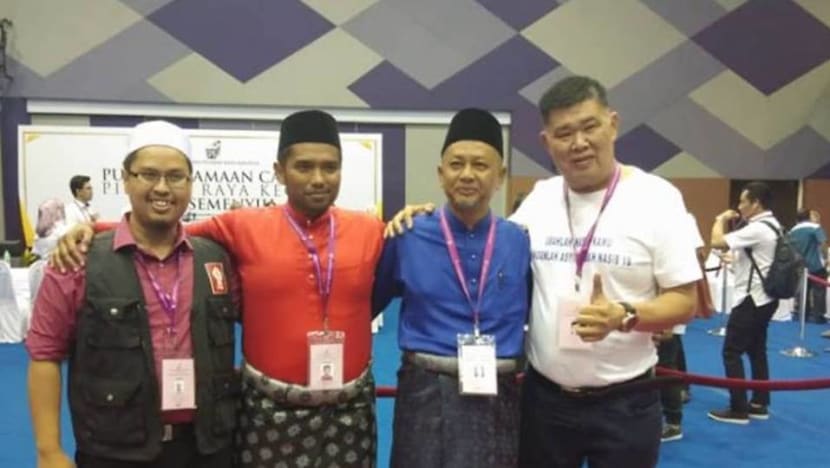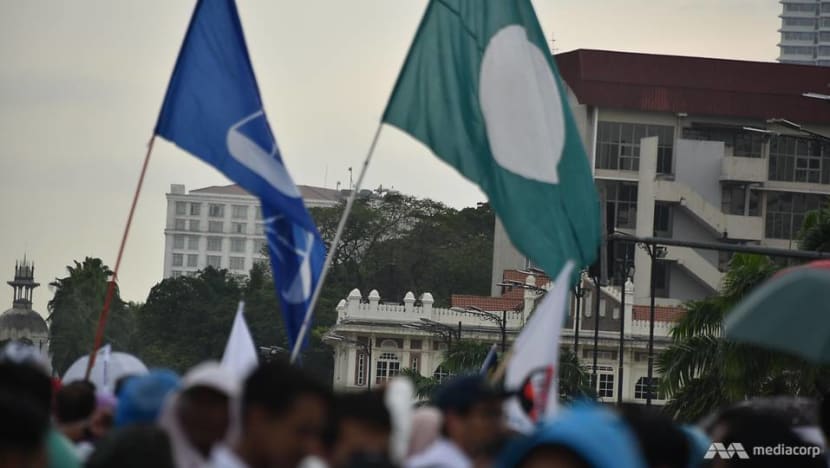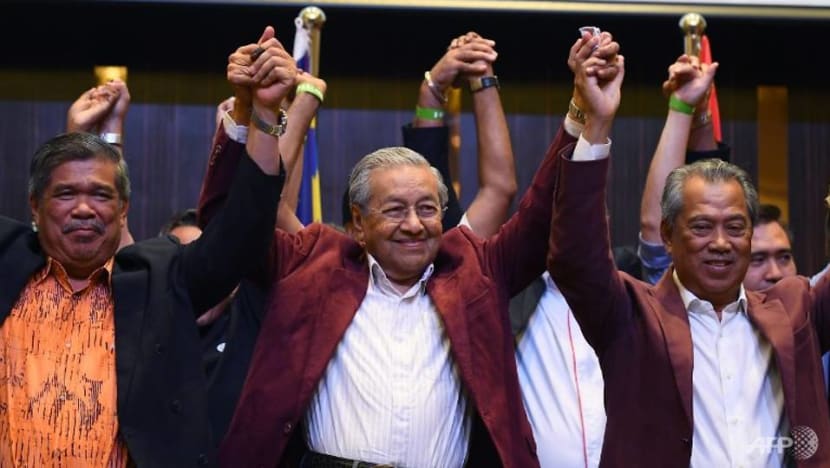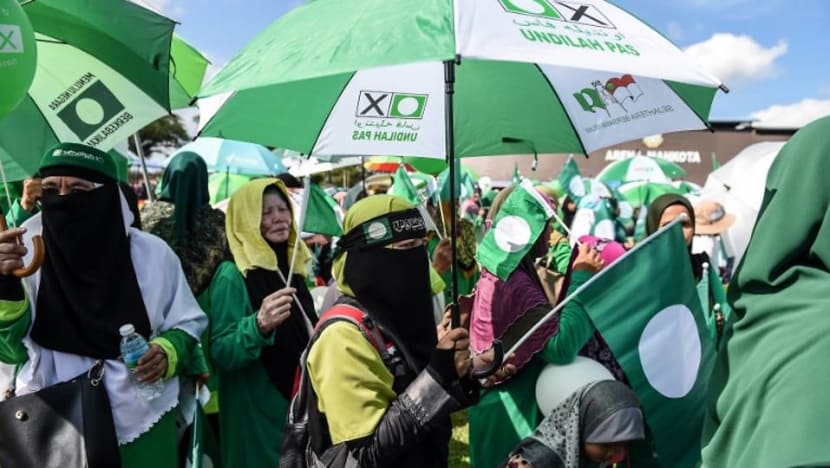commentary Commentary
Commentary: Looks like regime change hasn’t altered the Malaysian psyche
After two traumatising by-election defeats, some soul searching and courage will be needed to fix deep-seated issues that threaten to unseat the Pakatan Harapan government.

The four candidates contesting the Semenyih by-election. (Photo: Facebook@NikAzizAfiq)
TASMANIA: The results of the Semenyih byelection on Saturday was a shock for Pakatan Harapan (PH).
UMNO candidate, Zakaria Hanafi polled 19,780 votes to achieve a majority of 1,914 votes in the four-cornered fight. Zakaria defeated PH candidate, Muhammad Aiman Zainali, who polled 17,866 votes, Nik Aziz Afiq Abdul, 25, from Parti Sosialis Malaysia (PSM) (847 votes) and independent, Kuan Chee Heng, 725 votes.
IN TROUBLE
Midway through the campaign, PH knew the campaign was in trouble but they thought they could still win with a very small majority of several hundred votes. In last May’s general elections, PH had won the seat with a majority of 8,964 votes, a margin wide enough to withstand a swing - or so they thought.
Most people will tell you that there were two issues PH could not overcome in the by-election. The first was the candidate. PH’s candidate, Muhammad Aiman, is a 30-year-old member of Parti Bersatu Pribumi Malaysia (PPBM), the party founded by Mahathir to replace UMNO.
He was simply not impressive when compared to UMNO’s Zakaria, who has been in politics for more than three decades. To put it simply, most voters in Semenyih know Zakaria while Aiman had to introduce himself to the voters.
The second issue is the unholy alliance between PAS and UMNO. These two parties had the momentum, especially after their win at the Cameron Highlands by-election earlier this year. The very same issues raked up by PAS and UMNO successfully in Cameron Highlands were deployed again for Semenyih, and gave them the upper hand.
READ: The impasse over the East Coast Rail Link is hurting Malaysia’s credibility, a commentary
What were these issues?
MALAY SUPREMACY UNDER THREAT
Simply put, the PAS/UMNO narrative is about Ketuanan Islam (Islamic supremacy) and Ketuanan Melayu (Malay supremacy). The narrative could not be simpler - the current PH government is selling out Malay/Islamic political supremacy because DAP, the Chinese-based secular party in PH, yields too much power.
Because of DAP, Malays will slowly lose their “special rights” and the many economic privileges that comes with it. The DAP, according to UMNO, is planning to get rid of the New Economic Policy (NEP), the “holy grail” of Malay privileges.
Even worse, because of DAP interference, Islam is under threat.

The example given, in a campaign speech by Mohamed Nazri bin Abdul Aziz, ex-UMNO minister and BN’s secretary general, was that the Malays are unhappy that the attorney-general, chief justice and the finance minister were all non-Muslims.
He charged that these three posts should not have been given to a non-Malay in the first place because they could not take their oath of office by swearing on the Quran – and insinuated that these appointments were given at the behest of the DAP.
READ: So much for a new Malaysia, a commentary
Truth be told, all these accusations cannot withstand scrutiny. The Malays are the overwhelmingly majority in key institutions - the civil service and the armed forces (more than 80 per cent are Malays in both).
The Malays are also the majority in Parliament and the Cabinet. It is simply impossible for the Malays to lose political power with these configurations.
When it comes to Malay rights and Islam, it is also almost impossible to change policies and upend the political compact. Why? Any changes to do with Malay rights and Islam must get the consent of the Conference of Rulers, an unelected body made up of the nine Malay sultans and the King.
For the foreseeable future, it is beyond the realm of reality to think the Sultans would agree to change the system. Like all royalties elsewhere, tradition and continuity are the hallmarks of Malaysian royal families.
READ: Malaysia goes in search of a more inclusive growth formula, a commentary
THE RESISTANT CIVIL SERVICE
If that is the reality, why then is PAS/UMNO able to convincingly seed the narrative that Malays and Islam are marginalised by the PH administration?
Although the reasons are many, I believe the chief factors are as follows.
First, the PH government is still largely dysfunctional, even after almost one year since regime change. Ministers regularly contradict each other and worse, in terms of service delivery, not much has been done to roll out new initiatives. Part of it is the civil service.
Many of the new PH ministers are being played by the civil service who are still pro-UMNO. They are sabotaging PH’s reform agenda by simply going slow or doing nothing. Many of the new ministers appear to have little clue on how to get the civil service to serve them.

Second, the PH government lacks a proper narrative. They cannot seem to get the message out that they are implementing deep reforms, and this will take time, especially in the face of a resistant civil service. The public perception of PH has been poisoned by negative social media and PH appears to be on the defensive all the time.
OPTIMISM EVISCERATED
Third, the lives of ordinary Malaysians have not changed for the better. There was not much optimism for a “new” Malaysia after May 9.
Ten months down the road, the optimism has all but eviscerated as the polity realised that the cost of living has not gone down. Former Prime Minister Najib Razak and his wife are still not in jail.
Fourth, political expectations have not been met. For example, the Chinese thought that the long-standing issue of UEC recognition (the accreditation given through exams conducted in independent Chinese schools) would be resolved the moment DAP got into government. And why not since it was also one of PH’s key election pledges?
One year later, the issue is still unresolved.
For the Malays, they wanted to see the new government deal with corruption, kleptocracy and the excesses of UMNO. But not a single senior UMNO politician has been jailed and Jho Low is still walking free
And finally, the Malay polity in Malaysia has historically been driven by fear. During UMNO’s long reign, it was the fear of being taken over by non-Malays. Even PAS’s message was driven by fear.
PAS’s old message was that supporting UMNO means going to hell - again driven by fear. The Chinese bogeyman was such a permanent feature of Malaysian politics that even regime change cannot erase this irrational fear.
In other words, the country had a regime change but the Malaysian psyche is still the same.

QUO VADIS
So what does this mean moving forward? It means that the English-speaking middle class in Malaysia (the Bangsar crowd) and the non-Malay urban community must temper their expectations. They must give PH more time to settle down.
On the PH side, they had better take control of the civil service and start delivering. And they must start behaving as a single government, rather than a motley crew of political parties.
Professor James Chin is Director of the Asia Institute Tasmania at the University of Tasmania and Senior Fellow at the Jeffrey Cheah Institute on Southeast Asia.














